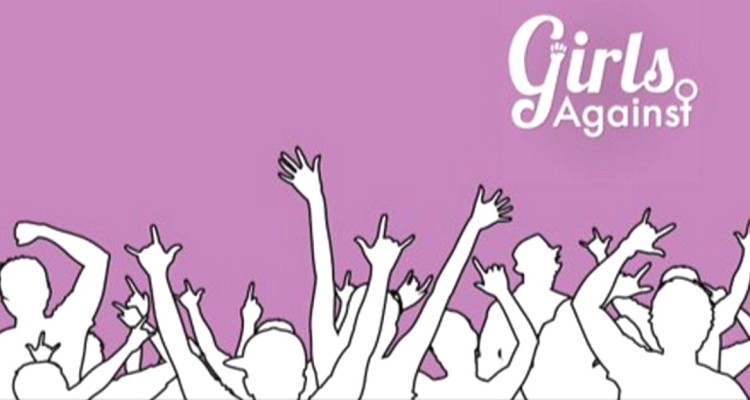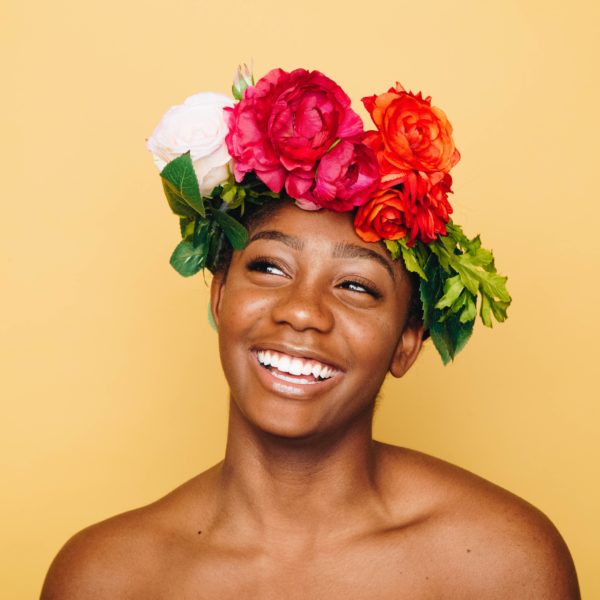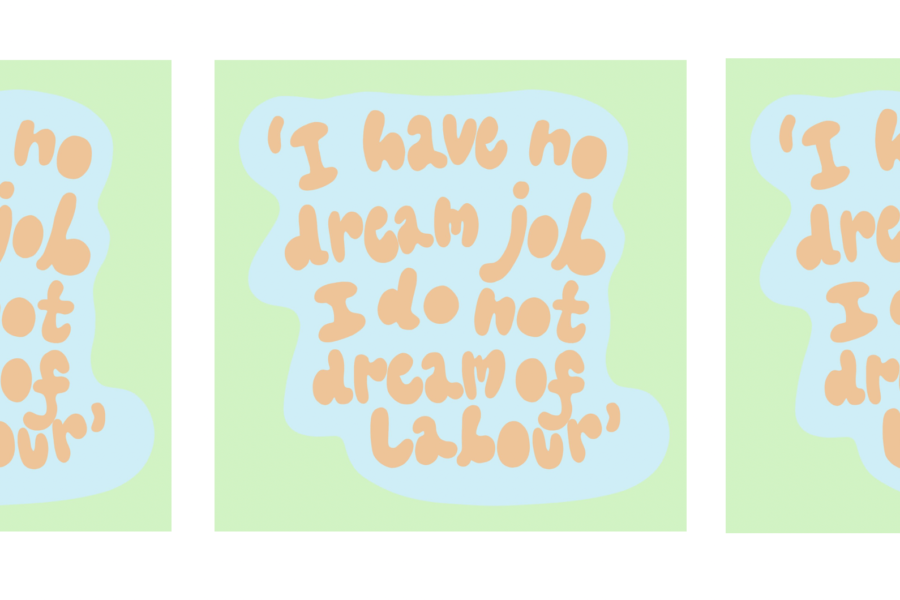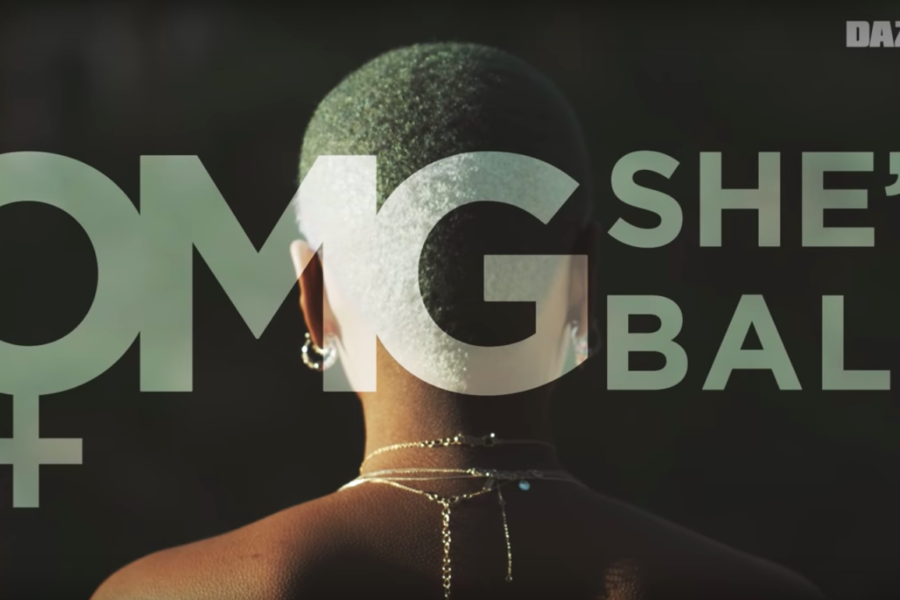I first met Anna at a training day for Sexpression, a club which trains volunteers to teach sexual education to teenagers at local secondary schools. When I introduced myself to her, the awkwardness of being in a room full of strangers entirely dissipated. She was warm and lively, chatting and laughing openly. But it wasn’t until we took a break for lunch that I realised how special she is.
When Anna was at school, she and four friends started a campaign called ‘Girls Against’, which advocated against harassment at gigs. Since its launch, the campaign has received attention from major media platforms such as BBC, NME and The Guardian, as well as from major musicians. So when we were brainstorming people to interview for the website, I knew that it had to be Anna. We met for a coffee earlier this week and spoke about the campaign, reclaiming public spaces as a woman and much more.
Can you tell me how Girls Against started and how it has developed since you began it?
So it started in 2015. A group of five of us would go to a lot of gigs and we noticed that a common occurrence for all of us was being sexually harassed there. But it was something we never really spoke about because we thought they were all isolated incidents. We didn’t know that it was something that all of us had been through.
So it wasn’t until one gig where my friend Hannah was assaulted quite badly that we spoke about it. We talked about it on twitter and got the attention of the lead singer of the band. It got picked up and suddenly loads of people were talking about it.
When it entered the mainstream conversation, we thought that if this has happened to so many people, we may as well do something about it. So we created a twitter account and from that the news caught on to it as well as loads of bands. They didn’t know this kind of thing happened at their gigs. It just blew up from there. Since then we have expanded globally and have worked with security companies ensuring that they have the right safety measures in place. We also have a presence at festivals like Reading and Leeds. They have our logo up on the screens and announce that if you need support go to security or contact us.
Was their any backlash you received when you started it?
Oh yeah, a lot of it. Mainly it was comments on articles. The BBC wrote article which received a lot of feedback. Somebody commented that ‘judging by the way they look, I doubt this has ever happened to them’. Also classic victim blaming comments like ‘what was she wearing?’. Just horrible, nasty, old men. But at the time, we just told ourselves that we had to laugh about it. We know what we’re doing is valid and we know what we’ve been through and that’s enough.
Have you had people come to you with any stories of abuse?
We’ve had some people come to us with really serious stories but we’ve always offered the help of experienced charities. We just want people to know that there are professionals that they can reach out to.
Why do you think that harassers think that they can get away with it in such a public space?
A lot of it has to do with power. But I think because you’re in such an enclosed space, because bodies are pressing up against each other; some people think they should see what they can get away with. A lot of people get a power rush thinking about what they can do. Obviously its not just men, but stereotypically it is. Some of them make moves on young females.Typically it’s the power trip resulting from the belief that there no consequences. That’s what we want to change.
What are the tips that you can offer people who may feel unsafe at a gig?
Make sure that you’re in the audience with people that you trust. So if something was to happen, you can communicate that. But our aim is to make security aware of these issues. A lot of the time people are too scared to report it but security should be able to spot it. Mostly they just ignore it or claim that they haven’t been trained to deal with it. If you’re feeling brave then turning towards the perpetrator and confronting them is always an option. But many people just freeze which is why we need good security.
Do you think that the campaign would have initially been taken more seriously if you were either a man or older?
A hundred percent. Even the name of our campaign; people are put off by it. But it shouldn’t matter because we are girls and we’re trying to empower ourselves by correcting something that affects us directly. But when we first started contacting bands and venues, they dismissed us for being these young and naive girls who didn’t have any experience with the real world. If we had been men, it probably wouldn’t be something we would have to deal with.
Do you think that since starting Girls Against you are now more confident occupying public space?
I think I am, but it depends on the situation. I think it will take a while for women to feel completely safe everywhere. But as far as gigs and clubs, I’ve become far more unapologetic. I just don’t give a shit anymore. I will report people who are making me feel uncomfortable. I have kneed a man in the balls before. It felt so good, but even just conducting myself; I’m confident.
Can you tell us some more about feminist icons whom you look up to?
A lot of musicians. One thing that really inspired me was an initiative called ‘Girls to the Front’ started by Kathleen Hanna, a punk singer in the early 90s. She would call all the women to the front and ask all the men to go to the back of the venue. In punk gigs there was no space for women because they were so violent. She gave women a space in the front to have a great time and dance without feeling scared. I just loved that. Reclaiming spaces from which women have traditionally been rejected is so important. And I met her, I was on stage with her representing our campaign!
Are there any things that you have learned that have made you question your own beliefs or attitudes?
I think we had to ensure that the campaign was inclusive. The last thing I would ever want is for anyone to feel excluded by it. As a white woman, I would hate to think that I had alienated a woman of colour or trans person. Also, our name is ‘Girls Against’ but we only called it that because we were a group of girls starting it. That doesn’t mean that only girls are victims or that we won’t support you if you’re not a girl. That’s a really important thing for me and I wish I could go back and make that clearer.
You said that ‘Girls Against’ is now a global campaign, have you noticed any patterns in responses around the world?
We are mainly UK wide but we have been represented in the US and in a lot of Europe. It’s a constant push for more and we get people reaching out and asking to represent us in their countries. Music is international and sexual assault is a wider issue, but the intersection isn’t addressed enough. When we first began we didn’t think it was a widespread issue. We only though it was restricted to the kind of music that we listened to. But it happens all across the board, in gigs of all genres. Like heavy metal gigs can get quite violent. It really does transcend all genres.
Other than ‘Girls Against’, which other feminist causes are you involved in or are passionate about?
So obviously Sexpression, to me sexual education is so important. I was teaching today and I was remembering when I was that age. I was thinking how we perceived sex at that age, how photos of girls would be spread and such disgusting things at such a young age. That’s why Sexpression is so important because all of the issues can be stopped through education and awareness. But I support every feminist cause really. Even looking at politics, the Scottish parliament is becoming increasingly better in regard to female representation. They have a crèche, whereas Westminster is so structurally unequal. Women aren’t supposed to be in there, it wasn’t built for women. You have to vote in person and the timings are awful so they clash with picking up kids from school. Recently, the first MP voted whilst on maternity leave. So definitely politics because if women don’t have a say in lawmaking then they will never have autonomy over themselves.
If you want to know more about Girls Against, then check out their website here: http://girlsagainst.org.uk/about/





Leave a Comment